|
3. Grades, Academic Ability and Societal Awareness
1) Self Assessment of Grades
Upon asking students about their current grades, only 22.3% of students in Tokyo evaluated themselves toward the top in their class (the percentage of students who selected ・・or ・・on a seven point scale), which was the lowest percentage among all cities. 29.9% of students in Seoul, 34.8% in Beijing, 40.3% in Helsinki, 43.2% in London and 54.9% in Washington, D.C. evaluated themselves toward the top showing that elementary school students in the three US and European cities tend to evaluate themselves highly.
Graph 3-1 Self assessment of grades
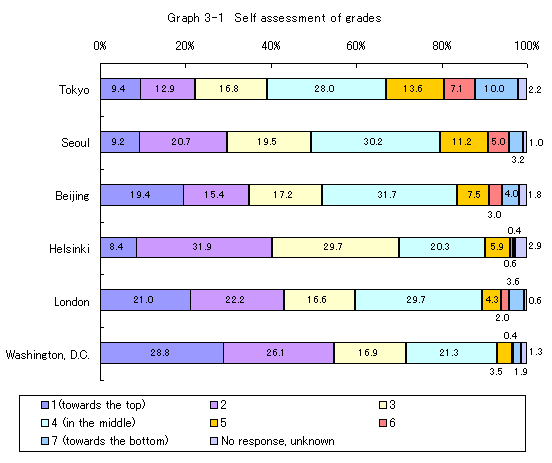
Graph 3-2 Grades you would be happy with
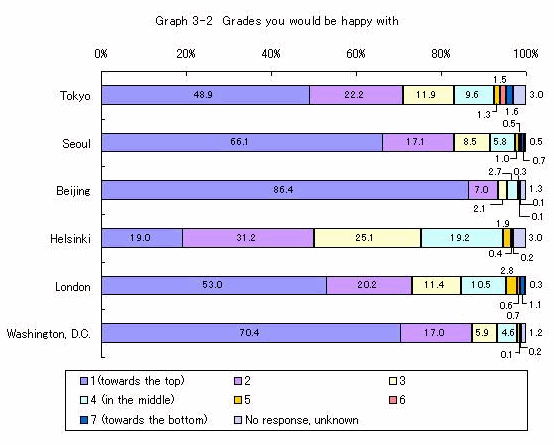
Graph 3-3 Grades you think you would receive if you tried your best
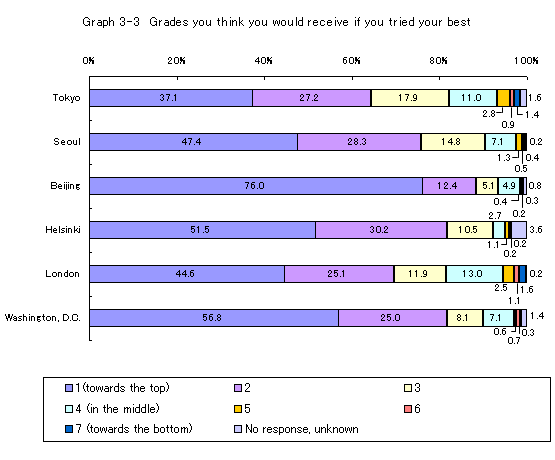
When students were asked to assess their grades, elementary school students in Tokyo distributed every ranging from 鍍owards the top・ 妬n the middle・ to 鍍owards the bottom・ Many students in Helsinki, London and Washington, D.C. placed themselves towards the top of their class while students in Seoul and Beijing ranked themselves between the three US and European Cities and Tokyo (Graph 3-1).
When asked the grades students would be happy with, 86.4% of students in Beijing responded ・ (towards the top)・, followed by 70.4% of students in Washington, D.C., 66.1% in Seoul, 53.0% in London and 48.9% in Tokyo, while only 19.0% in Helsinki suggesting a limited interest in grades among students in Helsinki (Graph 3-2).
Further, when asked the kind of grades students think they would receive if they tried their best, too, the percentage of students who responded ・・was highest also in Beijing (76.0%). In Helsinki 51.5% of students responded ・・ despite their having little interest in grades more than half of students in Helsinki believe they would be towards the top of their class if they tried their best. At 37.1% the percentage of students who responded ・・was lowest in Tokyo (Graph 3-3).

2) Study Related Worries and Motivation to Study
From this survey it appears that while elementary school students in Seoul have many study related worries, they are also highly motivated and always thinking about studying. The percentage of students who responded 鍍here are certain subjects I will never like・ and 的 do not know how to study well・ were higher in Tokyo than any other city while the percentage of students who responded 的 enjoy learning new things・was low.
Graph 3-4 Study related worries
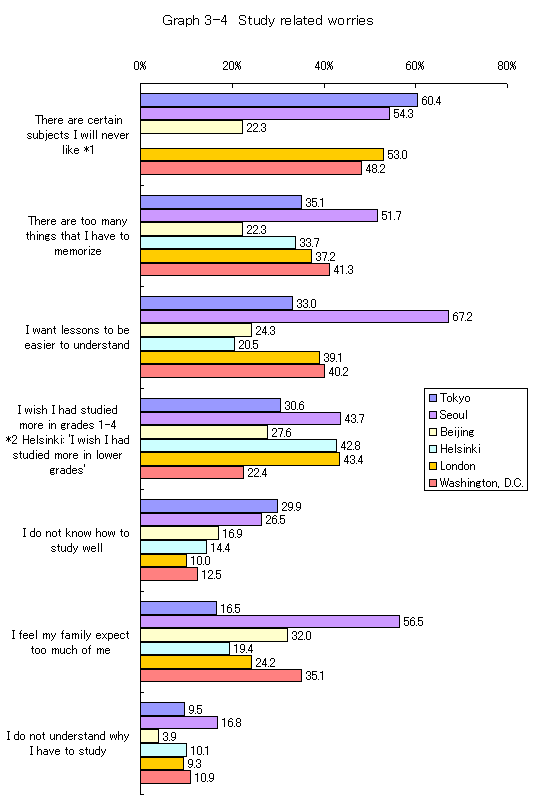
*1: 典here are certain subjects I will never like.・was not asked to students in Helsinki.
*2: Students in Helsinki were asked 的 wish I had studied more in lower grades・
*: Multiple responses.
When asked about their study related worries, the percentages of elementary school students in Tokyo who responding 鍍here are certain subjects I will never like・(60.4%), and 的 do not know how to study well・(29.9%) were relatively high, suggesting their main worries reside in weak subjects and study methods. In the Seoul the percentages of students who agreed 的 want lessons to be easier to understand・(67.2%), 的 feel my family expect too much of me・(56.5%), 鍍here are too many things I have to memorize・(51.7%) and 的 do not understand why I have to study・(16.8%) were higher among 6, this indicates that students in Seoul feel both external and internal pressure with regard to their studies.

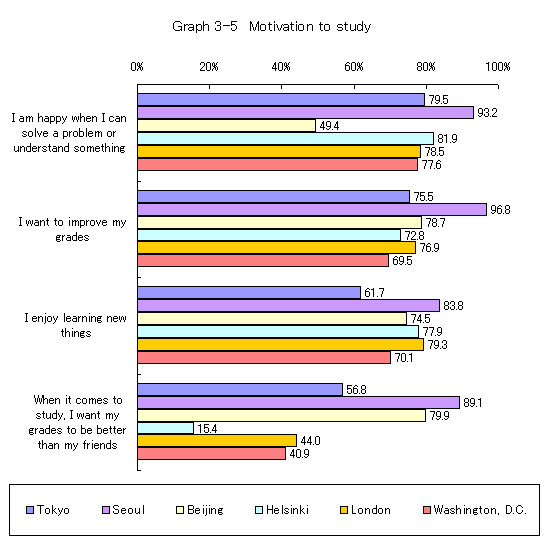
*: Multiple responses.
More elementary school students in Seoul, compared to other cities, agreed the four statements regarding motivation for studying. A set of two statement 的 want to improve my grades・(96.8%), and 努hen it comes to study I want my grades to be better than my friends・(89.1%) suggest a strong student痴 eagerness to improve, while another set 的 am happy when I can solve a problem or understand something・(93.2%) and 的 enjoy learning new things・(83.8%) indicate a strong sense of joy in studying. Not many elementary school students in Helsinki selected 努hen it comes to study I want my grades to be better than my friends・(15.4%), indicating that students do not try to compete with others in relation to studying. Compared to other cities, fewer students in Tokyo agreed 的 enjoy learning new things・(61.7%) while fewer students in Beijing agreed 的 am happy when I can solve a problem or understand something・(49.4%).

3) Usefulness of Study
When asked what purpose study will be useful, the response of 砥seful・by students in Tokyo to almost all questions were lower than in other cities. Compared to students in other cities, elementary school students in Tokyo do not really have perceived the usefulness of study.
Graph 3-6 Usefulness of study
典o work for a big important company・/span>
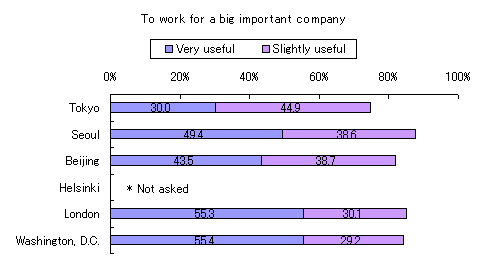
典o become rich・/span>
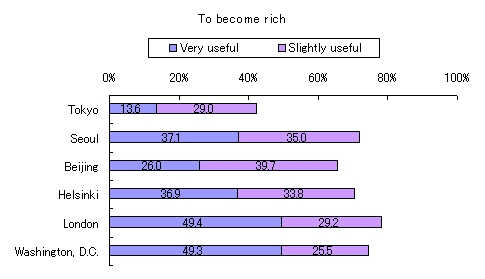
典o work for a company or the government and become successful・/span>
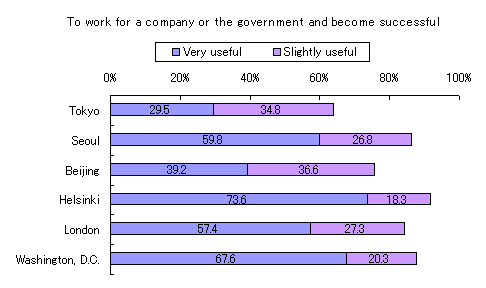
典o do something useful for society・/span>
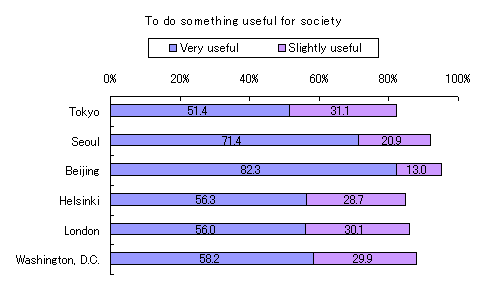
典o live a happy and fulfilled life・/span>
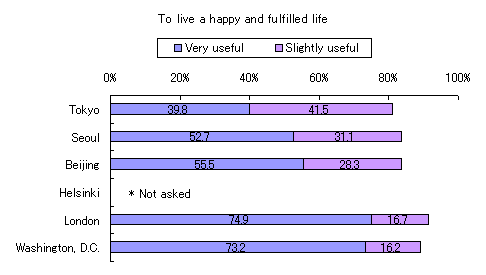
典o live a fun life enjoying hobbies and sports・/span>
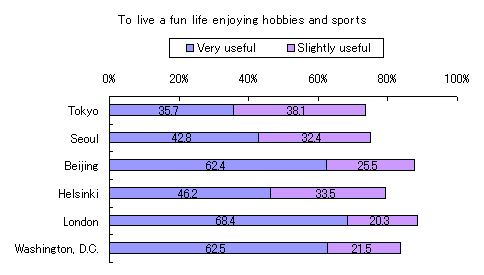
典o become a respectable person・/span>
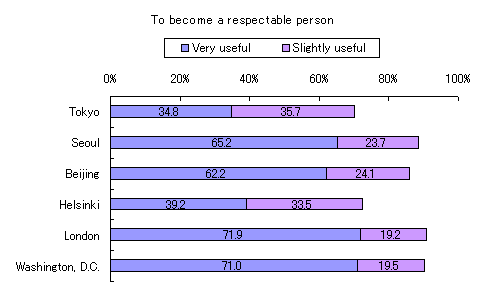
典o be a good parent・/span>
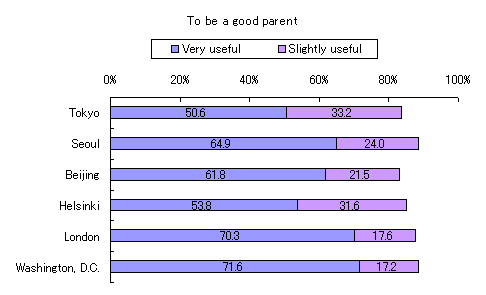
The result that more than 70 to 80% of elementary school students responding that study is 砥seful・(砺ery useful・+ 都lightly useful・ for most purposes suggest that students in all cities believe that studying is useful. However percentages for most items are lowest in Tokyo implying that perceived usefulness of studying among Japanese students is relatively low. The percentages of students who responded that study is 砥seful・鍍o work for a big important company・ (Tokyo 74.9% < other five cities 82.2 to 88.0%, same for other items), 鍍o work for a company or the government and become successful・(64.3% < 75.8 to 91.9%), and 鍍o become rich・(42.6% < 65.7 to 78.6%) were particularly low, indicating that elementary school students in Tokyo are less inclined than students in other cities to believe that study is a means to social success such as career advancement and salary.

4) View of Society and Values
Compared to elementary school students in other cities, students in Tokyo do not believe 笛apan is a highly competitive society.・and are not inclined to consider 妬n the future I want to work for a big company and have an important job.・Comparatively speaking, it can infer that students do not have a strong inclination to compete and be socially successful.
Graph 3-7 View of society, values
的 can be happy if I have close friends・/span>
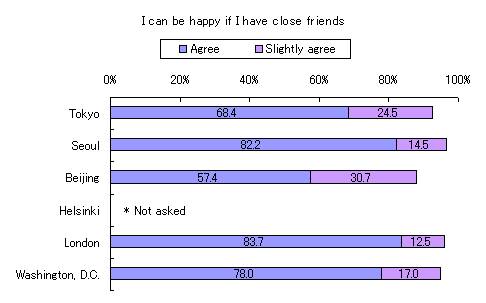
的 can be happy in the future if I graduate from a good university・/span>
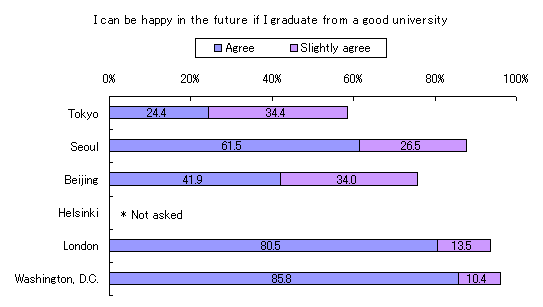
的 can be happy if I am rich・/span>
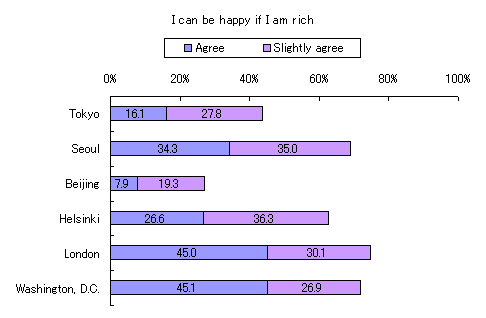
的n the future I want to work for a big company, and have an important job・/span>
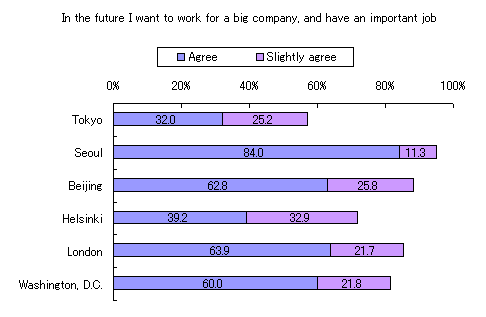
的n this country those who try hard are rewarded・/span>
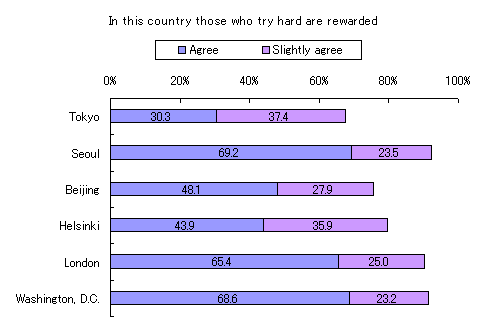
的 find society highly competitive・/span>
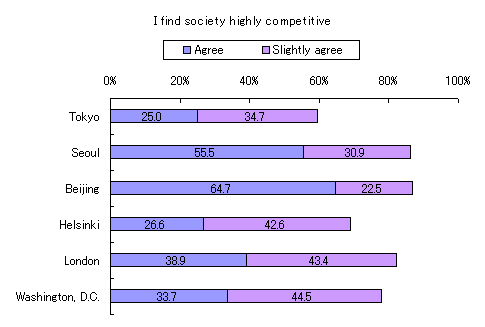
The first three items ask students what they believe to be necessary in order to be happy. The percentages of positive responses to 的 can be happy if I have close friends・(殿gree ・ 都lightly agree・ are universally high in all cities and no notable difference between cities has been shown. However, more than 90% of students in London and Washington, D.C. agreed that 的 can be happy in the future if I graduate from a good university・while the percentages were between 70 to 80% for students in Seoul and Beijing and just under 60% for students in Tokyo, showing a slight difference of opinion among students in the different cities. Further, just over 40% of students in Tokyo and just under 30% of students in Beijing agreed that 的 can be happy if I am rich・ which are lower than the percentages in other cities. Comparatively speaking, this appear that elementary school students in Tokyo do not really associate 堵ood universities・and 杜oney・with happiness.
When asked about their future, the percentage of elementary school students in Tokyo who agreed that 妬n the future I want to work for a big company and have an important job・(Tokyo 57.2% < other five cities 72.1 to 95.3%) was lower than ones in other cities.
Furthermore, regarding perceptions of one痴 own country and society, also was lowest in Tokyo, the percentage of agreement for 妬n this country those who try hard are rewarded・(Tokyo 67.7% < other five cities 76.0 to 92.7%, same for the other), and 的 find society highly competitive・(59.7% < 69.2 to 87.2%).
|

